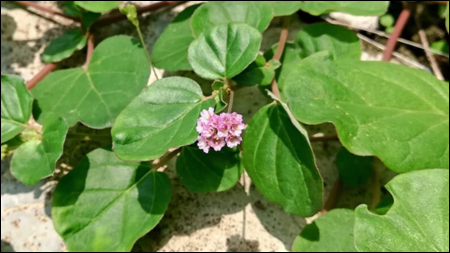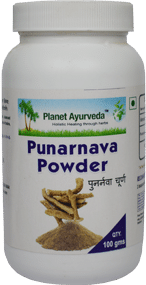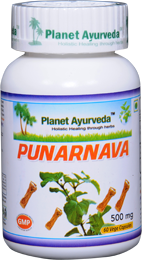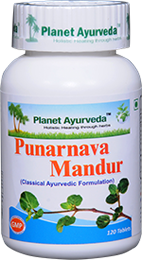Punarnava (Boerhavia Diffusa) – Uses, Properties, Benefits & Dosage

Introduction
Punarnava is one of the amazing herb in Ayurveda. It is effective to treat large number of diseases. It is the best natural diuretic and beneficial in renal and urinary conditions. It is also used for the treatment of liver disorders such as hepatitis and jaundice.
Description of Punarnava Plant
Punarnava is a perennial diffuse herb that has a horizontal stem that is usually purple. Plant length about 0.75–1 m. But sometimes it rises to 4 meters in the rainy season and in summer it dries up. Punarnava leaves are usually 2.5–4cm long, white and smooth at the bottom with rough green and smooth hairs on the upper surface. The flowers are small in size and red in color. Fruits are round or circular, about 1 cm long. These fruits contain seeds like cow beans. Punnaava roots are yellowish-brown to brown, long, rounded and twisted when the surface is dry. Plantations and flowers are performed during the winter.
Habitat
Boerhavia diffusa occurs throughout India. It is also found in Australia, Sudan, Pakistan, Sri Lanka, South Africa, Brazil and the southern United States. In India, it is an indigenous herb found in the Himalayan region up to an altitude of 2000 meters in the more temperate parts of the country.
Scientific Classification
- Kingdom: Plantae
- Clade: Tracheophytes
- Clade: Angiosperms
- Clade: Eudicots
- Order: Caryophyllales
- Family: Nyctaginaceae
- Genus: Boerhavia
- Species: B. diffusa
- Binomial name: Boerhavia diffusa
Name of Punarnava in Different Languages
- English Name – Red Hogweed, Spreading Hogweed, Horse purslane, Red spiderling, Pigweed, Tarvine
- Hindi Name – Gadha-cand, Gadahpurna, Gadah bindo
- Tamil Name – Mukaratte- Kirai
- Marathi Name – Ghetuli
- Tamil Name – Mukkurttaikkoti, Mukaratee-Kirei
- Telugu Name – Atakamamidi
- Urdu Name – Tukhm-i-ispas
- Malayalam Name – Tavilama
- Bengali Name – Punarnova
- Marathi Name – Punarnava, Vasu
- Kannada Name – Komme
- Nepalese name – Punarnava
- French Name – (Fr. Guiana) ipecacuanha de Cayenne
Parts Used Medicinally
- Punarnava Whole Plant
- Punarnava Root
- Punarnava Leaf
Watch Video on Punarnava Herb by Dr. Vikram Chauhan (MD Ayurveda)
Chemical Constituents
The chemical constituents of Punarnava are b-Sitosterol, a-2-sitosterol, palmitic acid, boerhaavia acid ester of b-sitosterol, boeravinon, tetracosanoic, hexacosonoic, hentriacontane, stearic, arachidic acid, urosilic acid, triacontanol, b-Ecdysone, punarnavine etc.
Ancient Verse for Punarnava

(Reference: Bhavprakash Nighantu / Guduchyadi Varga Edition of 1998: Shloka No. – 233)
Meaning: This shloka explains Punarnava is bitter in taste, light and becomes pungent in taste after digestion. It has cool potency and balances Kapha and Vata doshas. It helps to bind the stool and is used to manage cold cough, digestive fire and blood disorder.
Ayurvedic Properties of Punarnava
| Hindi / Sanskrit | English | ||
| Rasa | Madhura, Tikta, Kashaya | Taste | Sweet, Bitter, Astringent |
| Guna | Laghu, Rooksha | Physical Property | Light, Dry |
| Virya | Sheeta | Potency | Cold |
| Vipaka | Katu | Metabolic Property (After Digestion) | Pungent |
Medicinal Properties of Punarnava
- Diuretic (1) (2)
- Antistress (2) (3)
- Adaptogenic(2) (3)
- Immunomodulatory activity (2) (3)
- Antibacterial (4) and very high Antiviral activity
- Hypoglycemic activity (4)
- Anti Fibrinolytic activity (3) (4)
- Antiproliferative (4) and Anticarcinogenic activity (4)
- Antioxidant activity
- Hepatoprotective activity (5)
- Anti-inflammatory (6)
Benefits of Punarnava
In Chronic Kidney Disease (CKD)
Punarnava has diuretic, anti-inflammatory, antioxidant and many properties which make it effective in the kidney disease. Punarnava rejuvenates the kidney cells and help to balance the body fluids by eliminating the waste from the body. Punarnava is best herb for the chronic kidney disease (10).
In Urinary Tract Infections (UTI)
Punarnava has anti-inflammatory, antibacterial, anti-microbial, and anti-spasmodic, properties which this herb effective in urinary tract infection. UTI is very common in women, although it can also occur in men. Punarnava clears the infection, reduces inflammation and provides relief from pain (8) (7).
In Congestive Heart Failure (CHF)
Due to antioxidant and anti-inflammatory properties of punarnava it helps to induce edema which decreases the risk of congestive heart failure. (8).
For Healthy Liver
Punarnava possesses hepatoprotective property (5). It stimulate the bile secretion which helps to keep the liver healthy and improves the function of liver. It is also effective in the jaundice, ascites and other liver diseases.
In Kidney Stones
The diuretic property of Punarnava helps to improve the regular urination and reduce the buildup of fluids in the tissues. Therefore it is beneficial in kidney stones (8).
Fights Obesity
Punarnava is also helps to fight obesity (8). It helps to excrete extra body fluids from the body which is good for reducing obesity.
Treats Arthritis
Punarnava is very effective in the medical condition which affect joints and connective tissues (6). It provide relief from the joint pain and inflammation of the muscles. Thus it helps to treat arthritis (8).
In Diabetes
Punarnava has hypoglycemic property (4) (8). It helps to control the glucose levels and also increase the plasma insulin levels.
Effects of Punarnava on Body System
- Renal system – It shows effective result on renal system of the body. Especially its diuretic, antioxidant, anti-inflammatory make it useful in renal disorders.
- Hepatic system – Punarnava have hepatoprotective action.
- Cardiovascular system – It also shows good effects on cardiovascular system.
- Nervous system – Punarnava shows rejuvenating properties on nerve system (8). It is very good for sciatica or nervous weakness and many other nervous disorder.
How to Use?
- Punarnava should be consumed with water post meal only.
- It should not be taken on empty stomach because it can cause burning sensation.
- Do not take it with milk.
Dosage
- Whole plant decoction: 20-30g (whole plant)
- Fresh juice: 10-20ml
- Root powder: 1-3 g
Special Note
There are two types of Punarnava- red and white, which are found in Nighantu. In Raj Nighantu, a blue type is also written, which is not visible. Two plants of two different classes, Boerhaavia diffusa and Trianthema portulacastrum, are being used in the name of Punarnava. Most of the scholars have considered the first of these as Rakta Punarnava, which is not correct. In fact, in the first itself, two types are found in the form of Rakta Pushp and Shwet Pushp and in the second also, Shwet Pushp and Rakta Pushp varieties are seen. In such a situation, it is not correct to consider only Boerhaavia as Rakta Punarnava and Trianthema (Pathri) as Shwet Punarnava. In Raj Nighantu, apart from the types of Punarnava, two different plants have been mentioned by the names ‘Varshabhu’ and ‘Vasuk’. Among the synonyms of Punarnava, this synonym is Kshudravarshabhu. Shri Thakur Balwant Singh Ji considers Punarnava and Varshabhu to be two different plants and not synonyms.
Side Effects of Punarnava
- Punarnava can increase the blood pressure
- It may create burning sensation in the throat if taken on an empty stomach or without water.
- You must not use Punarnava if you have any ethanol related allergies.
- Pregnant women should be avoided to take Punarnava.
- The children below12 years of age should avoid the use of this herb.
Precautions to be Taken
- Do not take Punarnava with alcohol because it contains alcohol in it. It may cause drowsiness.
- It should not be taken before driving.
- Do not take overdose of punarnava, it can create medical problem on overdose.
- It is not addictive herb but always prefer to take after consulting physician.
Effect on Dosha
Punarnava have effects on Tridosha. It make balance in Vata and Kapha dosha of the body. It increase the vata dosha and manage Kapha and Pitta dosha.
This herb is used in preparation of herbal products. Planet Ayurveda offered best products of containing standardized extract of Punarnava herb.
Planet Ayurveda’s Products that Contain this Herb as an Ingredient
1. PUNARNAVA POWDER
Punarnava powder is very useful in kidney disease, water retention, digestive disorders, constipation, liver disorders, skin problems, joints pain, edema, inflammation, urinary tract infections, cough, cold, tuberculosis, asthma, obesity, ascites, and eye disorders.
Dosage: 1/2 to 1teaspoonful of powder two times a day with plain water after meals.
2. PUNARNAVA CAPSULES
Punarnava Capsules are very effective to treat water retention and edema. It possesses anti-inflammatory property which helps to reduces inflammation and swelling naturally. Punarnava helps to support the healthy functioning of the body system including renal, hepatic, cardiovascular, and digestive and nervous system.
Dosage: 1-2 capsules twice daily with plain water after meals.
3. PUNARNAVA MANDUR
Punarnava mandur comes under the classical formulations in Ayurveda. It is effective in many conditions such as renal failure, ascites, liver failure, fatty liver, fluid accumulation, glaucoma, puffy eyes, anemia, etc. It helps to manage blood count, blood quality, eliminate toxin from the blood, decrease cholesterol, urea/creatinine level. These act as natural diuretic.
Dosage: 1-2 tablets twice or thrice a day with plain water after meal.
References
- https://www.ncbi.nlm.nih.gov/pmc/articles/PMC4630688/
- http://www.chemijournal.com/archives/2018/vol6issue4/PartB/SP-6-4-18-635.pdf
- https://scialert.net/fulltext/?doi=ajaps.2011.663.684
- http://www.florajournal.com/archives/2016/vol4issue2/PartA/4-2-15.pdf
- https://www.sciencedirect.com/science/article/pii/0378874191900156?via%3Dihub
- https://www.hindawi.com/journals/bmri/2014/808302/
- https://www.researchgate.net/publication/268814069_ANTIBACTERIAL_EFFECT_OF_BOERHAVIA_DIFFUSA_AND_PUNARNAVASAVAM_ON_URINARY_TRACT_INFECTION_UTI_CAUSING_PATHOGENS
- http://www.phytojournal.com/vol1Issue1/Issue_may_2012/5.pdf
- https://irjponline.com/admin/php/uploads/1270_pdf.pdf
- http://medical.cloud journals.com/index.php/IJAAYUSH/article/view/Med-171







Health problem
Share your disease details on our email id: herbalremedies123@yahoo.com or you can contact us at +91 6209123456, you will be guided with the proper medications and diet by our top Ayurveda Experts Team.